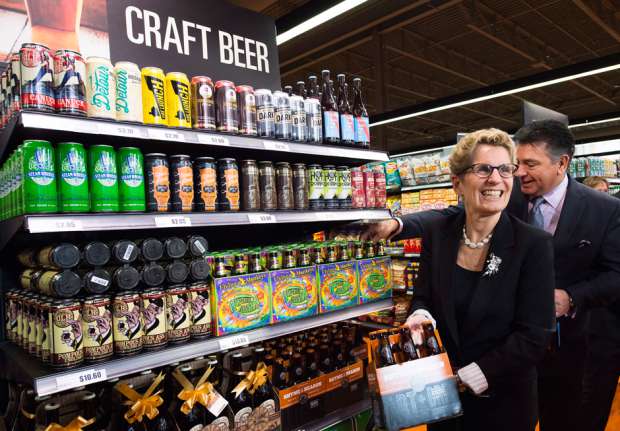|
Ontario’s premier made history Tuesday simply by purchasing a six-pack of beer at a Toronto grocery store, something that hasn’t been legal in the province since Prohibition.Kathleen Wynne, 62, smiled when she was asked for proof of age as she purchased a pack of Rhyme & Reason from Toronto’s Collective Arts Brewing at a Loblaws store, starting the long-promised rollout of beer sales in select grocery outlets across the province.
“It’s nice to be carded,” she joked with the cashier before announcing that 58 grocery stores across Ontario can now legally sell beer. “Today the wait is over. Beer is here, in grocery stores, just in time for the holidays.” The Liberal government’s goal is to have six-packs of beer available at 58 grocery stores by the end of this year — 13 of them independents — and eventually expand to 450 grocery retailers, both large and small, by 2017. That’s roughly the same number of retail outlets the Beer Store currently operates in Ontario. Ontario now joins Quebec and Newfoundland and Labrador, two provinces that also sell beer in grocery stores. New Brunswick sells a limited selection of wines at some grocery stores, while Ontario sells Canadian wines at some grocery stores and at Wine Rack locations. It’s all about making life easier for people who lead very busy lives, said Wynne. “Anything that government can do to help people save a little more of their time is worthwhile, is what government’s should be doing,” she said. “It’s also one of the main reasons that we have embarked on the biggest shakeup to alcohol sales since the end of Prohibition.” The other reason, said Wynne, is fairness, insisting the government was creating a level playing field for brewers big and small. At least 20 per cent of grocers’ shelf space for beer must be dedicated to products from small brewers. “So that the province’s incredible craft brewers can continue to grow in a fair and efficient beer market,” said Wynne. In addition to allowing sales of six packs at some grocery stores, selected LCBO stores will sell six and 12-packs of beer, but the foreign-owned Beer Store will retain exclusive rights to sell cases of 24. The government didn’t want to “blow up” the Beer Store’s cost-effective distribution network, which keeps Ontario beer prices among the lowest in Canada, said Wynne. “And the Beer Store is returning to its co-operative roots by opening up ownership to all Ontario-based brewers, and that was the original impetus behind Brewers Retail,” she added. Finance Minister Charles Sousa said the government would be appointing a beer ombudsman in January. “I’m encouraged by how much interest there seems to be in this position,” he said. Last month, the government announced 13 grocery stores chains were chosen to sell beer in the first round, including retail giant Walmart, Metro Ontario and Sobeys. Of the initial 58 beer licences, 13 went to independents including Starsky Fine Foods in Hamilton, Pino’s Get Fresh in Sault Ste. Marie and J-&-B La Mantia in Lindsay. Not all of them were immediately ready to start selling beer. “We understand from some of the outlets that it’s going to take them a few days to get up and running, but they can order the beer today,” said Wynne. Loblaws announced Tuesday that beer is now available in 19 of its outlets, including some Real Canadian Superstore, Your Independent Grocery and Fortinios locations. “As our display space expands into the new year, we anticipate we’ll offer over 200 varieties of domestic, imported and local beers in our stores,” said Loblaw’s COO Grant Froese. “And we have the opportunity for regional favourites on a store by store basis.” Wynne again rejected the idea of selling beer in corner stores — something first promised by the Liberal government of David Peterson 30 years ago — warning “the price of beer would go up if you put it in convenience stores.” Just minutes after the first beer sales at an Ontario grocery store, Wynne was asked why grocers couldn’t also sell marijuana once the federal government legalizes it. The premier said Monday “it makes a lot of sense” to have the LCBO sell marijuana because of its secure distribution network and history of socially responsible sales. “I think leaving it to random distribution is not acceptable,” she said Tuesday. “It is going to have to be controlled in some way, and I’ll await the federal government’s direction on that.” Source Keith Leslie, Postmedia News
0 Comments
Leave a Reply. |
Advertisement
News & Updates
Stay informed with the latest news around foodservice, agriculture and other related food news. Advertisement Opportunities
|


 RSS Feed
RSS Feed


